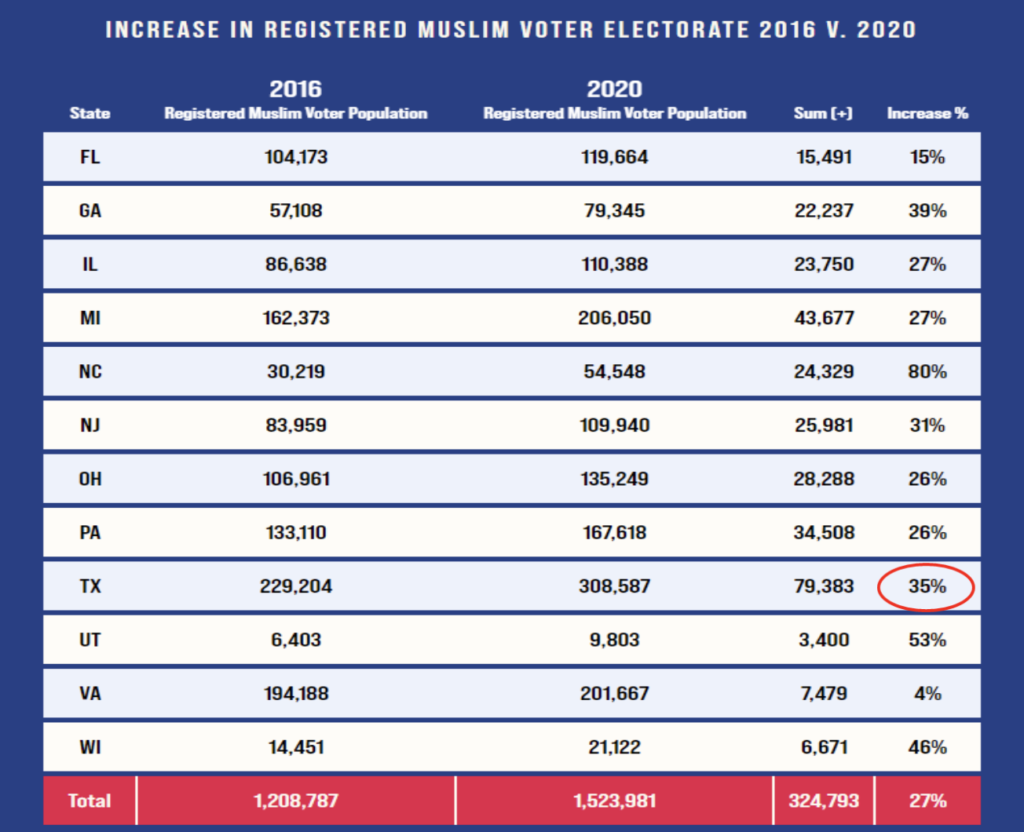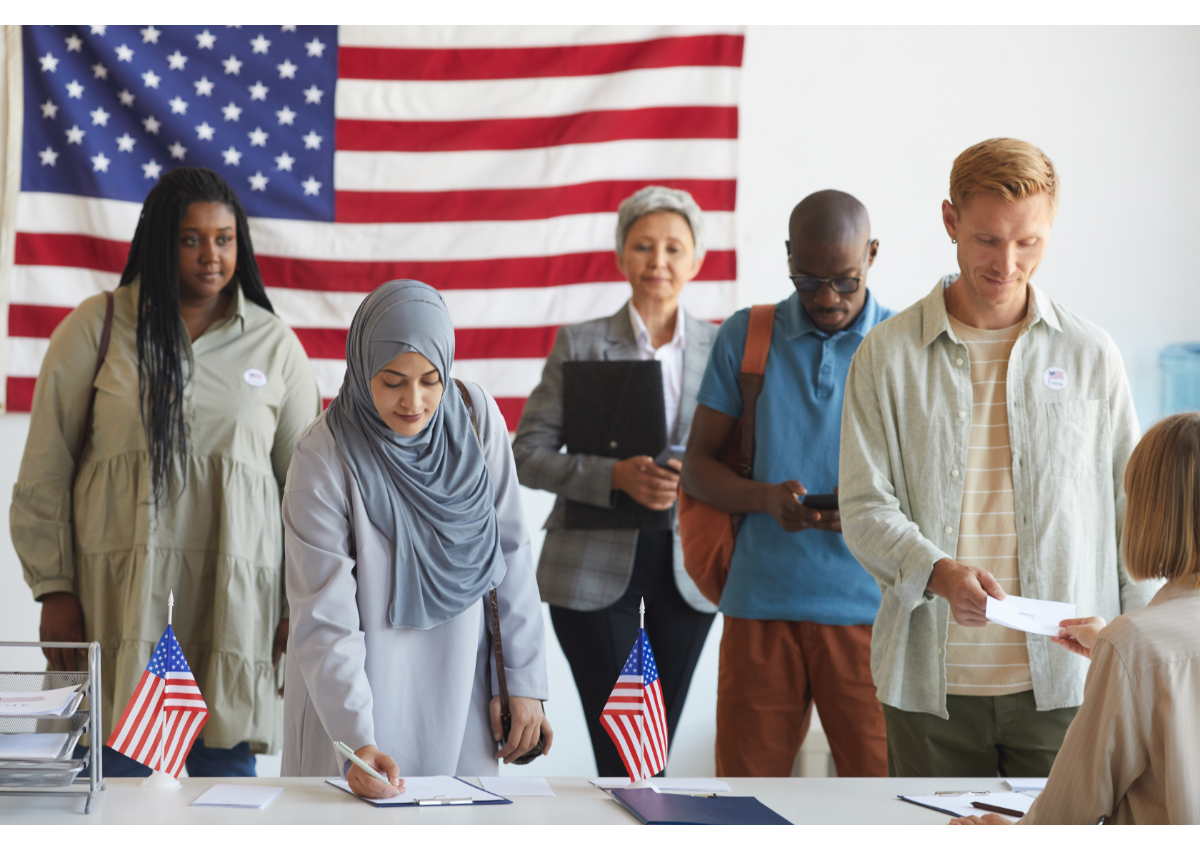Despite the fact that the Muslim vote is often overlooked, it can swing U.S. elections — particularly in close races.
At a Feb. 22 briefing held by Houston Ethnic Media, AJ Durrani — Treasurer of Emgage Texas and the first Muslim American to serve on the Democratic National Committee — highlighted record national and state-level increases in the Muslim vote, and its impact in light of the 2024 elections.
Expanding the Muslim electorate
Emgage had even more staggering success in 2020 on the national level with the Million Muslim Votes campaign — the largest Muslim mobilization program in history.
Focusing on 12 states including Texas, Emgage organizers made 1.8 million calls, sent over 3.6 million text messages and over 400,000 mailers, knocked on over 20,000 doors.
The effort led to 1,086,087 million, or 71% of registered Muslim voters casting a ballot — two percentage points over the 2016 turnout. From the turnout, 779,793 Muslim voters, or 52%, voted early or via absentee ballots.
The campaign also expanded the Muslim electorate 27% from 1.2 million registered voters in 2016 to over 1.5 million in 2020. In some states, registered Muslim voters increased as much as 80% (North Carolina), 53% (Utah), 46% (Wisconsin) and 35% (Texas).

Despite the record turnout, “we don’t take that for granted any single week,” said Durrani. “Our staff in Texas is still out doing voter registration. It’s almost unheard of for a whole area to have anything like 70% turnout” — voter registration among Muslims is over 75% — “but we’ve been able to do so over here primarily through getting a very specific message out to our community.”
In Harris County, containing the greater Houston area, Emgage similarly worked to increase Muslim voter turnout from below 60% in 2012, to 66% in 2016, to 71% in 2020. That year 218,899 Muslims voted statewide, with 89% voting early or absentee and 35% more registered to vote than in 2016.
However, before 2006, when Emgage Texas was founded and the first three Muslims were elected to the state’s Democratic Executive Committee, there was no collective Muslim electoral outreach effort in Texas at all, said Durrani.
The reason was a lesson reflected for Muslim voters nationwide, he added: “Voter outreach requires funding, and it wasn’t until 2016, when I was elected, that we were able to get grant funding through work with AAPI organizations,” revolutionizing what Emgage “was able to do. Our first emphasis was to increase voter registration.”
Voter outreach
“We use normal get-the-word-out techniques through Muslim-Arab-South Asian ethnic media” including full-page ads, primetime radio, TV ads, geographically targeted canvassing, postal mailers and social media through outlets like BOLTV, PakNews, Sangeet Radio and Naya Andaaz, explained Durrani, “but we’ve also gotten the Muslim vote out by understanding that many community members congregate in Islamic centers.”
“For 10 years, Emgage had been making efforts to get one of our centers to become a polling location,” he continued. “We were blunted in our efforts by the prior administration, but in 2016, we approached the county clerk Teneshia Hudspeth, and we got the first Islamic center, the Turkish Community Center, to become a polling location.”
Since then, 10 Islamic centers are polling locations in Harris County as of January 2024.
Personal outreach methods like these have been most successful at getting Muslims to vote, he added. Despite pandemic-related challenges, Emgage Texas made over 200,000 calls, sent over 355,000 text messages and continually hosted voter registration events at local mosques which were later turned into early vote and polling locations in the months leading up to election day in 2020.
Getting Muslim community members to be election judges and election workers has also been effective, Durrani said. “I’ve been an Election Judge for over 15 years, and when people see somebody they recognize or a location that they are frequenting for religious or social services, they’re more apt to walk across the hall after their Friday prayers and vote.”
What’s next for 2024?
“Now, many people are saying: ‘It doesn’t matter, look what’s happening overseas in Gaza,” Durrani continued. “Our message to the community is: ‘Do not sit out the elections.’ While focusing on the presidential primaries in Texas may not have much of an impact,” the Muslim vote can be decisive in swing states and for down-ballot candidates and issues.
“People might say, ‘Your community is relatively small, how can it have an impact?’” Well, most elections happen to be very narrow, and in many swing states more Muslims voted than Biden won by in 2020,” he added.
In Arizona, for instance, Biden won by less than 10,500 votes when over 25,000 Muslims voted; in Georgia, by 12,000 votes when over 61,000 Muslims voted; in Pennsylvania, by 81,000 votes when over 125,000 Muslims voted; in Michigan, by 154,000 votes when over 145,000 Muslims voted; and in Wisconsin, by less than 21,000 votes when over 15,000 Muslims voted.
“All politics are local,” Durrani said. “That’s basically our message. Don’t sit out the election — vote, and vote now.”





